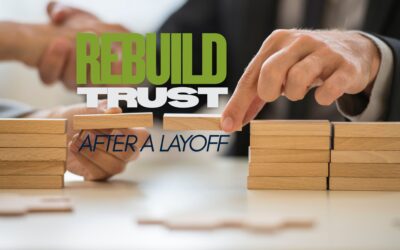Why Outplacement Matters More Than Ever
In today’s unpredictable economy, workforce reductions of one person to hundreds have become an unfortunate reality for many companies. As business leaders strive to cut costs and maintain operations, they are often pressured to eliminate anything deemed non-essential. Outplacement services can fall into that category, but only at first glance.
When companies skip outplacement, they often underestimate the long-term impact on their culture, values, and reputation. Cost-cutting does not have to mean culture-killing. In fact, how a company handles layoffs says more about its true values than almost anything else.
Ethics and values are on display for the world to see and it is clear when pressure is applied, what companies really value.
Your mission statement likely speaks to integrity, respect, and valuing people. But it is in moments of crisis, like a layoff, when these values are truly tested. Offering outplacement services isn’t just a nice gesture for departing employees; it’s a clear signal that your company walks the talk when it comes to treating people with dignity.
When organizations support impacted employees with career transition assistance services, they reinforce a message to all stakeholders: We care, even when it’s hard.
Outplacement is more than a benefit; it is a brand protector for the long term.
While outplacement might be seen as an added cost, the true cost comes when a layoff is handled poorly:
- Remaining employees—those “survivors”, experience guilt, fear, and a loss of trust.
- Leadership is perceived as cold or disconnected.
- Online reviews and social media may reflect negatively on your brand.
- Future hiring becomes more difficult when your reputation is damaged.
- Impacted employees have families and friends who will hear and see the value of care.
Conversely, companies that provide outplacement report higher trust and loyalty from remaining staff. Research from Harvard Business Review supports this, showing that layoffs handled without care can erode brand loyalty, retention, and productivity for years. (Downsizing Lost It’s Bad Rap – Harvard Business Review). One of our clients recently shared:
“We’ve heard such kind feedback from those who used your outplacement services. It’s been a game changer, not just for them, but for the morale of those who stayed. They feel proud of how we handled it.”
That kind of feedback can’t be bought, but it can be earned through intentional, value-driven action.
The survivor effect:
They’re watching and will be discussing and talking among themselves and even reaching out to those who have been impacted in the reduction.
Often overlooked is the impact layoffs have on the employees who remain. These team members are watching closely. They ask:
- How are my former teammates being treated?
- Is this still the kind of company I want to work for?
- Am I next?
- If I am next, will they do the same for me?
When employees see that their colleagues are being cared for, it eases anxiety and rebuilds trust. Survivors are more likely to stay engaged and productive when they see leadership acting with empathy and responsibility.
Outplacement as an intentional and strategic investment creates a culture that is remarkable.
Here’s the bottom line: Outplacement is not a luxury, it’s a strategic investment in your people, your culture, and your brand.
By helping former employees land on their feet, companies:
- Strengthens their employer brand
- Retain and engage top talent
- Demonstrate leadership integrity
- Reduce risk and protect reputation
In a world where talent is watching and word travels fast, how you part ways matter, just as much as how you onboard new and future talent into your company.
Summary – Culture isn’t built in the good times, it’s revealed in the tough times. Offering outplacement support during a reduction in force is one of the clearest ways to show your commitment to doing the right thing. It doesn’t just help those leaving, it sends a message to those staying that you are a company that takes care of people. That’s the kind of culture worth protecting.




